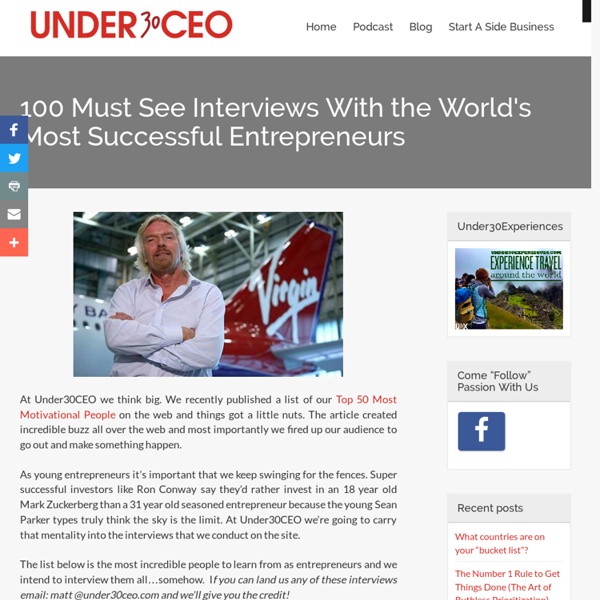Can Building Great Products Help You Build Great Teams? - Deep Nishar
Silicon Valley was built on amazing products, not on stellar leadership skills. In fact, veterans of some of the world’s most successful tech companies often look with skepticism, even disdain, on efforts to build strong management skills. The premise is that all energy should be focused solely on turning fabulous ideas into hyper growth. It’s true that if a start-up fails — or is sold — the need for enduring leadership may never arise. And in the earliest stages of a company, the need to organize, motivate and inspire large groups of people to accomplish shared goals may not be obvious. But neglecting the art of people management has significant costs for any company that aspires to be around for a while.
Entrepreneuriat social
Un article de Wikipédia, l'encyclopédie libre. Selon Amandine Barthélémy et Romain Slitine[1], cette forme d'entrepreneuriat, au service de l'intérêt général, recouvre l’ensemble des initiatives économiques dont la finalité principale est sociale ou environnementale et qui réinvestissent la majorité de leurs bénéfices au profit de cette mission. L'entrepreneuriat social est apparu au cours des années 1990 en Europe et aux États-Unis avec des approches différenciées. En France, les entrepreneurs sociaux sont fédérés au sein du Mouvement des entrepreneurs sociaux (MOUVES). Ce mouvement définit ainsi l'entrepreneuriat social : « Les entreprises sociales sont des entreprises à finalité sociale, sociétale ou environnementale et à lucrativité limitée.
Stop pretending it’s all a party: The social contract of working at a startup
By Sarah Lacy On June 25, 2013 Perhaps it’s because I’ve worked my whole career in media and startups. But I’m having a hard time getting super lathered up about Bloomberg’s takedown of what it is like to work at Fab. Don’t hang your jacket on the back of a chair?
Social entrepreneurship
Social entrepreneurship is the process of pursuing innovative solutions to social problems. More specifically, social entrepreneurs adopt a mission to create and sustain social value. They pursue opportunities to serve this mission, while continuously adapting and learning. They draw upon appropriate thinking in both the business and nonprofit worlds and operate in all kinds of organizations: large and small; new and old; religious and secular; nonprofit, for-profit, and hybrid.[1] Business entrepreneurs typically measure performance in profit and return, but social entrepreneurs also take into account a positive return to society.
Gaz de schiste, fracturation hydraulique : pourquoi tant de craintes ?
Aux États-Unis, près de 20.000 puits d'exploitation du gaz de schiste devraient voir le jour chaque année jusqu'en 2035 (selon un article paru en juillet 2012 dans Environmental Health). Cependant, jusqu'à 10 puits pourraient être creusés par plateforme afin de réduire l'impact sur le territoire. © Justin Woolford, Flickr, cc ny nc sa 2.0 Gaz de schiste, fracturation hydraulique : pourquoi tant de craintes ?
The Psychology of Entrepreneurial Misjudgment, part 1: Biases 1-6
Mar 24, 2008 Charlie Munger is an 80-something billionaire who cofounded top-tier law firm Munger, Tolles & Olson and is Warren Buffett's long-time partner and Vice-Chairman at Berkshire Hathaway, one of the most successful companies of all time. Some people, including me, consider Mr. Munger to be an even more interesting thinker and writer than Mr. Buffett, and recently a group of Mr. Munger's friends assembled a compilation book of his most interesting thoughts and speeches called Poor Charlie's Almanack, inspired by Ben Franklin's Poor Richard's Almanack.
7 Books That Should Be on Every Entrepreneur's Bookshelf
Posted by Guest Author on July 23, 2012 in Business Start Up Advice [ 5 Comments ] While most of the greatest lessons that you’ll learn as an entrepreneur will probably come from mistakes and challenging experiences, published works such as books, whitepapers, blog posts, and the like still provide a lot of value for business owners. Books in particular are great resources because they can offer credibility and in-depth commentaries that most online sources can’t match. Below are some of the best books that entrepreneurs can have on their bookshelves. Whether you’re looking for some motivation to continue with your venture, or wondering how the most successful entrepreneurs got to where they are now, these 7 books are definitely worth checking out. The Lean Startup by Eric Ries
Leverage Points: Places to Intervene in a System
Solutions Classic How do we change the structure of systems to produce more of what we want and less of that which is undesirable? After years of working with corporations on their systems problems, MIT’s Jay Forrester likes to say that the average manager can define the current problem very cogently, identify the system structure that leads to the problem, and guess with great accuracy where to look for leverage points—places in the system where a small change could lead to a large shift in behavior. This idea of leverage points is not unique to systems analysis—it’s embedded in legend: the silver bullet, the miracle cure, the secret passage, the magic password, the nearly effortless way to cut through or leap over huge obstacles. We not only want to believe that there are leverage points, we want to know where they are and how to get our hands on them.



